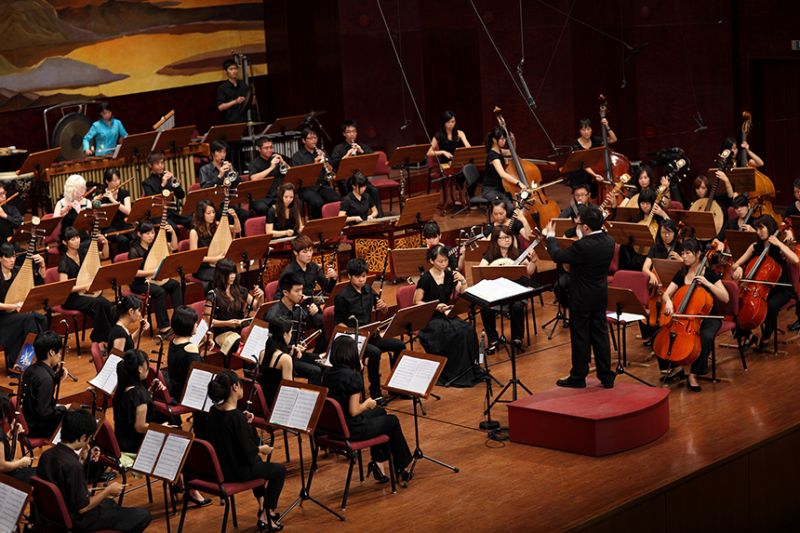Little Giant Chinese Chamber Orchestra 小巨人絲竹樂團 (Taiwan)

2000年10月,由音樂總監陳志昇集合一群熱愛國樂藝術、並具有專業演奏水準的青年樂手們籌組成立「小巨人絲竹樂團 (Little Giant Chinese Chamber Orchestra, “gCO”)」,以絲竹樂編制為主,積極進行國樂推廣工作。
自2002年起,積極與兩岸名家合作,策劃一系列「兩岸薪傳」、「絲竹室內樂」及「青年演奏家」音樂會;2007年受邀至德國卡斯魯爾市新媒體藝術中心 (ZKM, Zentrum für Kunst und Medientechnologie)演出;2008年受邀至「香港國際中樂節」演出;2010年受邀至「加拿大愛民頓中樂節」演出,並赴廣東、北京、天津等地舉辦【源自台灣】大陸巡迴演出六場次;2011年以【雲山雁邈】音樂會入圍「第九屆台新藝術獎」十大表演藝術節目,受邀赴黑龍江參加【第二屆黑龍江 中俄文化大集暨「中俄雙子城」之夏藝術節】演出,受邀於【亞洲作曲家聯盟2011年大會暨亞太音樂節】演出;2012年受荷蘭新室內樂團(Nieuw Ensemble)之邀赴荷蘭阿姆斯特丹舉辦【2012年荷蘭巡迴演出】;2013年赴杭州、南京、北京、鄭州等地舉辦【印象‧台灣-當代絲竹室內樂展】 大陸巡迴演出五場次,並受新加坡鼎藝團之邀於濱海藝術中心舉辦【寶島巨人】音樂會。
2005年迄今連續獲選為中華民國行政院文建會演藝扶植團隊,並獲得教育部、國立傳統藝術中心、台北市文化局、財團法人國家文化藝術基金會等政府及民間單位的藝文經費補助,在藝術表現上備受肯定。
經過十餘年的試鍊,小巨人絲竹樂團已成長為兼具演奏技術及藝術內涵的新生代樂團;深自期許在每一場策劃及演出中,均能展現台灣新生代樂手的積極熱情,為根植於傳統的國樂藝術開創嶄新的風貌。
Little Giant Chinese Chamber Orchestra (Taiwan)
The Little Giant Chinese Chamber Orchestra (“gCO”) was founded in October 2000 by its artistic director and conductor Chih-Sheng Chen. The gCO has since matured into an ensemble of both technical and artistic proficiency. A strong musical force in Taiwan, it represents a new generation of Chinese orchestral music. It strives with great energy and passion from its dedicated musicians in every performance. The gCO breathes new life into an art form that holds ancient roots, and devotes itself to promoting Chinese music on the international stage.
The gCO’s repertoire ranges from the classics of Chinese traditional works to the latest contemporary compositions by Taiwanese and Chinese composers. The gCO offers a full season of approximately thirty concerts a year at the prestigious National Concert Hall in Taiwan, presenting both the full orchestra of over one hundred musicians and smaller chamber ensembles throughout the year. In recent years, the orchestra has presented large-scale interdisciplinary projects, combining theatre and multimedia with orchestral music. In addition, the gCO presents over 60 educational performances every year, introducing thousands of young audience to Chinese music in every city in Taiwan, including small communities off the main island. The gCO has released three CDs and one DVD.
Internationally, the orchestra has collaborated with the Nieuw Ensemble (Amsterdam), Atlas Ensemble (Amsterdam), Turning Point Ensemble (Vancouver), Vancouver Inter-Cultural Orchestra, and Ding Yi Music (Singapore), commissioning/performing original works by Asian, North American, and European composers. Its international appearances include multiple tours in Europe (including the 2007 Flying Circus Festival in Germany), South Asian (including 2013 Ding Yi Chinese Chamber Music Festival, Singapore), China (including 2008 Hong Kong International Chinese Music Festival), Mexico, US, and Canada (2010 & 2015 Edmonton Chinese Music Festival, 2014 & 2018 Sound of Dragon Music Festival, 2015 Vancouver Jazz Festival, 2018 Festival International de Musique Actuelle de Victoriaville).
The gCO has hosted the residencies of numerous Chinese composers, as well as Dutch composer Joel Bons (2012), Korean composer Cecilia Heejeong Kim (2012, 2014), Canadian composers Mark Armanini (2011), Lan Tung (2011 & 2018), John Oliver (2014), Farshid Samandari (2018), Bic Hoang (2018), and Alice Ping Yee Ho (2019). The orchestra has given the world premiere or Asia premiere of their music at the National Concert Hall of Taiwan.
Phoenix Rising – Farshid Samandari (Canada, 2018)
Mark Takeshi McGregor (Canada) – flute
This is a single movement flute concerto and depicts the rise of the phoenix: “Out of the ashes rises the phoenix.” This dramatic work portrays the cycle of death, birth and the rise of a new phoenix, which is common among many different cultures. It begins with the demise of a mature thriving phoenix as the soloist is introduced. The second section uses free rhythmic structures and controlled improvisation. Eventually as a new phoenix is born, the music becomes more rhythmic and metric.
Monkey Running – John Oliver (Canada)
Worshipping Dong Huang – Kuang-Chih CHENG (Taiwan)
Pei Chin CHUANG & I-Shan CHUNG erhu
《東皇太一》- 鄭光智作曲
莊佩瑾、鍾宜珊 – 二胡
This is the second work from the composer’s “Nine Songs” series, inspired from his reading of “Nine Songs” by Qu Yuan, a legendary poet of the Chu State during the Warring States Period. “Worshipping Dong Huang” is the first chapter of Qu Yuan’s “Nice Songs”. The composer has written the piece weaving together two themes: 1) worship: the power of a common belief that can go beyond imagination; 2) sacrificial rituals: seeking hope through prayers and rituals. The music is divided into three sections: Heaven, Nature, and Worship. The various combinations of musical instruments represent the rich diversity in the world. The two soloists represent both awe and deep longing, as well as the energy of the nature. The rituals begin with the gathering, climax with dancing, and end with diminishing music.
